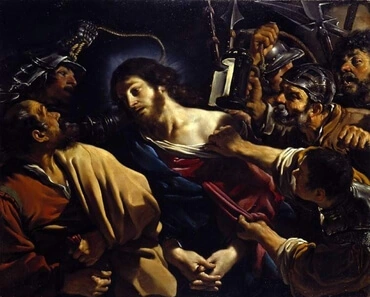Explanation of John 1:10
By Brian David

The beginning of John 1 illustrated how divine truth – which is the ultimate expression of the Lord’s love – is the actual creative force of the universe and of reality itself. That idea is reinforced here: "him" refers to Jesus, who was the physical embodiment of divine truth, which indeed made the world.
This verse offers another level, though. "World" represents the church, which is defined in the Writings as "where the Lord is known and where the Word is." By that definition a "church" can be as small as one person, or as large as billions of people worshiping through a wide variety of denominations. And the Writings tell us that the Lord has made sure that such a church always existed, from prehistoric times when the Lord offered "the Word" – His truth – to people directly up through today, when we have the Word in the form of the Bible.
But the world did not know him. At the time the Lord came among us as Jesus, people had turned away from the deeper meanings of the Word (which they then had in the form of the Old Testament), and had little to no concern for knowing the Lord. His church – the church among the Children of Israel – had turned away.
This might seem like a merely historic idea, something that happened then but has little to do with us now. But each one of us is a "church," and each one of us can know the Lord and the Word, or turn away. We all go through states when we are like the church at the time the Lord was born, and He can rebuild us now even as He rebuilt the church then. For that to happen, though, we need to turn to the Word – the Bible – and know the Lord.
(References: Apocalypse Explained 1093; Canons of the New Church 9; The Apocalypse Explained 294 [16])
Arcana Coelestia #8940
8940. 'And if you make for Me an altar of stones' means a representative kind of worship in general that is composed of truths. This is clear from the meaning of 'an altar' as a representative of Divine worship in general, dealt with in 921, 2777, 2811, 4489; and from the meaning of 'stones' as truths, dealt with in 643, 1298, 3720, 3769, 3771, 3773, 3789, 3798, 6426, 8609. There is worship of the Lord that springs from good, and there is worship of Him that springs from truth. Worship of the Lord springing from good was represented by an altar of soil, and worship springing from truth by an altar of stone. Regarding the first and the second kinds of worship, see above in 8935. It was because an altar of stone was a sign of worship springing from truth that they were commanded to set up such an altar as soon as they crossed the Jordan and came into the land of Canaan, and to write on it the Commandments contained in the Law, that is, God's truths from heaven. For by the Ten Commandments are meant all God's truths in summary form. That altar is spoken of in Moses as follows,
When you cross the Jordan you shall set up for yourself large stones, and coat them with lime. Then you shall write on them all the words of the Law. Afterwards, you shall build there an altar to Jehovah your God, an altar of stones, which you shall not hew with any iron tool. 1 With whole stones you shall build the altar of Jehovah your God, and present 2 on it burnt offerings and eucharistic offerings. And you shall write on the stones of the altar the words of the Law, expressing them very plainly. Deuteronomy 27:1-8; Joshua 8:30-32.
[2] The reason why they were to write the words of the Law on stones of the altar was that truths were meant by 'stones', and worship that springs from truths by 'an altar of stones'. This was also the reason why the Ten Commandments, which were a sign of Divine Truths in their entirety, were inscribed on tablets of stone. The reason why it had to be done as soon as they crossed the Jordan was that the Jordan, which was the first and outermost boundary of the land of Canaan on the side where the wilderness lay, meant introduction into the Church or heaven, which is accomplished through cognitions or knowledge of truth and good, thus through truths from the Word, 4255. For all the rivers serving as boundaries of that land meant the first and outermost reaches of the Lord's kingdom, 4116, 4240. By 'the stones of the altar' the truths of faith are also meant in Isaiah,
He will remove sin when He makes all the stones of the altar like chalk-stones scattered about. Isaiah 27:9
This refers to the ruination of the Church. 'The stones of the altar like chalk-stones scattered about' stands for the truths of faith that inspire worship after something similar has happened to them. As regards altars in general, they were made out of soil, stones, bronze, wood, and also gold - out of bronze, wood, and gold because these materials served to mean good. For an altar of bronze, see Ezekiel 9:2; for an altar of wood, Ezekiel 41:22; and for an altar of gold, which was the altar of incense, 1 Kings 6:22; 7:48; Revelation 8:3. That 'bronze' means good, see 425, 1551; that 'wood' does so, 643, 2784, 2812, 3720, 8354; and that 'gold' does so as well, 113, 1551, 1552, 5658.
Footnotes:






